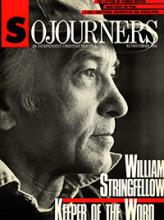It was late in the year of 1952 when I first encountered the diminutive person of William Stringfellow. He had taken up residence in a Harlem tenement building to be a "layperson in the church." Lay theologians and prophets in the Episcopal Church were few and far between and were for the most part suspect or lightly regarded because they were not properly trained in the priesthood of the church. For many of us who knew and loved him, Bill Stringfellow changed all that and literally turned the hierarchy of the Episcopal Church upside-down.
One of the chief joys in Bill's life took place when he served as my lawyer when I was presented for trial because my parish, St. Stephen and the Incarnation in Washington, D.C., permitted the Rev. Allison Cheek, then irregularly ordained, to celebrate the Eucharist. During the trial, Bill called the Rt. Rev. John Allin, presiding bishop of the Episcopal Church, to be a witness. The bishop, ignoring the summons, did not respond, and Bill moved that the bishop be held in contempt of the court. His motion was upheld by the trial judges. Except for affirmation from the two lay judges, that was our single victory during the trial. I will never forget Bill's sense of vindication in this moment as he triumphed over the institutional injustice of the church.
All of his writings expressed his righteous anger toward the church, which he felt strongly had been enculturated by secular society and had ignored the Bible as the mediator of the Word of God. In this perspective no theologian in my time has ever been able to translate into the life of this world a more meaningful interpretation of the book of Revelation, which was the seed bed for his life and thought. He often used this quote in his writings: "Behold, he is coming with the clouds, and every eye will see him, everyone who pierced him; and all tribes of the earth will wail on account of him. Even so. Amen" (Revelation 1:7).
Read the Full Article

